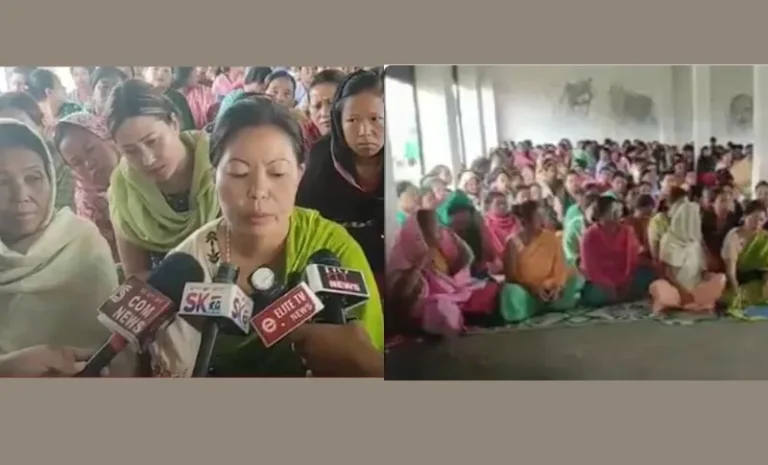Manipur Security Forces Intensify Operations: Two Arrested, Three Illegal Bunkers Destroyed
Summary of Recent Developments
In a decisive move to bolster security and restore peace in Manipur, state and central police forces have intensified operations across vulnerable regions. These efforts have led to the arrest of two individuals and the dismantling of three illegal bunkers, underscoring the commitment to curbing unlawful activities and ensuring the safety of residents.
Introduction
Manipur, a state nestled in the northeastern corridor of India, has long been a tapestry of rich culture and complex socio-political dynamics. In recent times, the state has grappled with challenges stemming from insurgent activities and ethnic tensions, necessitating robust security interventions. The recent operations leading to arrests and the destruction of illegal bunkers signify a pivotal stride towards re-establishing order and peace in the region.
The Context: A Land of Diversity and Discord
Manipur’s diverse demographic landscape is both its strength and its Achilles’ heel. Home to various ethnic communities, including the Meitei, Kuki-Zo, and Naga groups, the state has witnessed periodic unrest rooted in historical grievances, territorial disputes, and demands for autonomy. These underlying issues have occasionally erupted into violence, disrupting the social fabric and hindering development.Wikipedia+1Sentinel Assam+1
The Surge in Insurgent Activities
The past few years have seen a surge in insurgent activities, with armed groups exploiting ethnic fault lines to further their agendas. These groups have established illegal bunkers and amassed weaponry, posing significant threats to both security forces and civilians. The proliferation of such bunkers, particularly in districts like Kangpokpi, has been a matter of grave concern. These structures serve as strategic points for insurgents, facilitating ambushes and providing safe havens, thereby emboldening their operations.Pratidin+2The New Indian Express+2Wikipedia+2Wikipedia+4Sentinel Assam+4Pratidin+4
Recent Security Operations: A Closer Look
In response to the escalating threats, security forces have launched comprehensive operations targeting insurgent strongholds. A notable operation in Kangpokpi district resulted in the dismantling of 15 illegal bunkers, disrupting the operational capabilities of these groups. The coordinated efforts of the Manipur State Police and the Assam Rifles led to the confiscation of firearms, ammunition, and communication equipment, underscoring the preparedness of insurgents to engage in prolonged conflicts. English.Mathrubhumi+1Pratidin+1Wikipedia+4Sentinel Assam+4English.Mathrubhumi+4
Similarly, in the Koutruk hill range, security forces destroyed over seven illegal bunkers following intense gunfights. These operations not only neutralized immediate threats but also sent a clear message regarding the state’s resolve to combat insurgency. The New Indian Express
The Role of Intelligence and Community Cooperation
The success of these operations can be attributed to actionable intelligence and community cooperation. Local communities, weary of the perpetual state of unrest, have begun collaborating with security forces, providing crucial information about insurgent movements and hideouts. This synergy has enhanced the efficacy of operations, leading to timely interventions and minimizing collateral damage.
Challenges in Counter-Insurgency Operations
Despite the successes, several challenges persist in the counter-insurgency landscape of Manipur:
- Terrain and Accessibility: The state’s hilly terrain and dense forests offer natural cover for insurgents, complicating surveillance and operational maneuvers.Pratidin
- Ethnic Sensitivities: Operations in ethnically sensitive areas require meticulous planning to avoid exacerbating tensions. Missteps can lead to alienation of communities and fuel further unrest.
- Resource Constraints: Sustained operations demand substantial resources, including manpower, equipment, and logistical support. Ensuring the continuous availability of these resources is a persistent challenge.
- Insurgent Adaptability: Insurgent groups often adapt quickly to security strategies, employing guerrilla tactics and leveraging local support networks to evade capture.
Government Initiatives and Policy Measures
Recognizing the multifaceted nature of the insurgency problem, the government has adopted a holistic approach encompassing security measures, development initiatives, and dialogue:
- Enhanced Security Measures: Deployment of additional forces, establishment of new checkpoints, and increased patrolling in vulnerable areas have been prioritized to deter insurgent activities.
- Development Programs: Initiatives aimed at improving infrastructure, education, and healthcare are being implemented to address socio-economic disparities that often fuel insurgency.
- Dialogue and Reconciliation: Efforts to engage insurgent groups in peace talks are ongoing, with the aim of addressing legitimate grievances and integrating them into the democratic framework.
The Impact on Civilian Life
The prolonged insurgency has had profound implications for the civilian population:
- Displacement: Frequent clashes have led to the displacement of communities, resulting in humanitarian crises and loss of livelihoods.
- Psychological Trauma: Continuous exposure to violence has inflicted psychological scars, particularly among children and adolescents.
- Economic Stagnation: The pervasive insecurity has deterred investment and hampered economic growth, perpetuating a cycle of poverty and unrest.
The Path Forward: Building Sustainable Peace
Achieving lasting peace in Manipur requires a concerted effort from all stakeholders:
- Inclusive Dialogue: Engaging all ethnic communities in dialogue to address historical grievances and promote mutual understanding is crucial.
- Strengthening Governance: Enhancing transparency, accountability, and responsiveness in governance can build public trust and reduce the appeal of insurgent ideologies.
- Empowering Local Communities: Investing in community-led development projects can create economic opportunities and dissuade individuals from joining insurgent groups.
- Regional Cooperation: Collaborating with neighboring states and countries to address cross-border insurgency and arms trafficking can mitigate external support to insurgent groups.
FAQs
- What prompted the recent security operations in Manipur?
- Escalating insurgent activities and the discovery of illegal bunkers necessitated intensified security measures.Pratidin
- What are illegal bunkers, and why are they significant?
- Illegal bunkers are fortified structures used by insurgents for operations and defense. Their presence indicates organized insurgent activities.
- How do security forces identify and target these bunkers?
- Through intelligence gathering, surveillance, and community cooperation, security forces locate and dismantle such structures.
- What challenges do security forces face in these operations?
- Difficult terrains, distinguishing insurgents from civilians, and potential ambushes are primary challenges.
- What measures are being taken to ensure lasting peace in Manipur?
- Combining security operations with political dialogue, economic development, and cultural integration initiatives.




